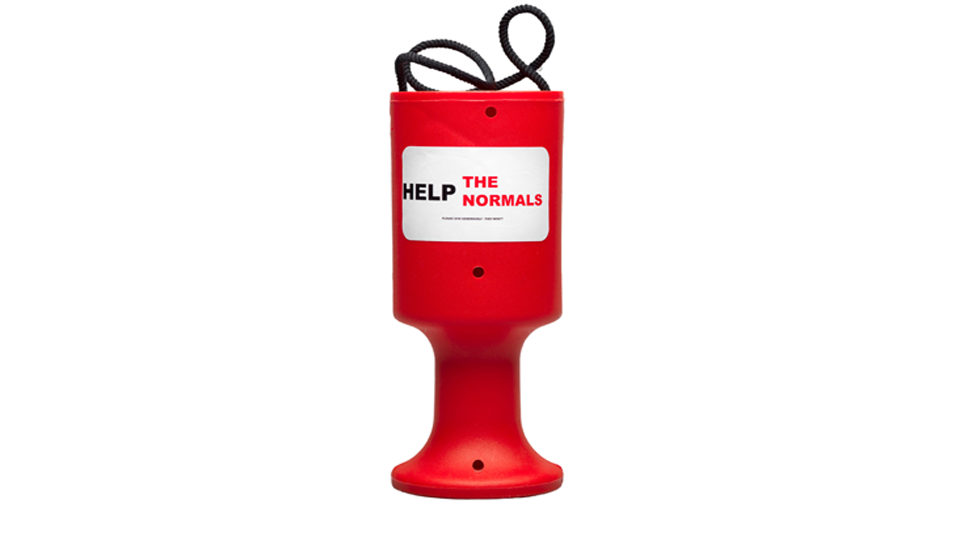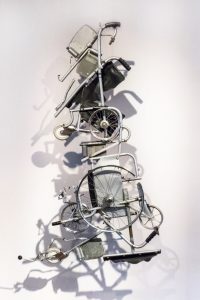
On Wednesday 16 November 2022 (until 16 October 2023) People’s History Museum (PHM) will open a new landmark exhibition that has been in development since 2018. Nothing About Us Without Us explores how disabled people’s rights have been fought for over centuries and the activism that has led this march forward. It’s the first time the story has been told this way and its telling has been led by four community curators who all identify as disabled people. It will look at the past, the present and a future in which the fight is ongoing.
Nothing About Us Without Us highlights the campaigns and actions carried out by disabled people to break down barriers to achieve an inclusive society and includes protest material and objects, such as banners and t-shirts; many of these collected from disabled activists and disabled led campaign groups, with very few pieces having been previously exhibited. As community curators Anis Akhtar, Hannah Ross, Ruth Malkin and Alison Wilde have brought their own experiences, connections and extensive research to the project. Their work began in 2021, but this was preceded by the establishment in 2018 of a steering group of disabled people who have supported this project and others at People’s History Museum.
Ruth Malkin, Community Curator for People’s History Museum, says, “Nothing About Us Without Us has been one of the most life affirming, positive work experiences of my life (and I’m getting on a bit!). It has been truly empowering to work with a group of incredible disabled people to tell the story of our community’s history.
“People coming to the exhibition will get a sense of the incredible disabled people past and present who have tirelessly campaigned and raised awareness to make life better for all disabled people both now and for the future. They will get a sense of just how far we have come as a society from the days when disabled people had no choice but to enter a workhouse and beg to stay alive. They will laugh at the satirical cartoons, cry at the appalling stories of disablist discrimination and share the triumph at the battles fought and won by disability rights campaigners dating back to the 19th century. I’m hoping that they will leave informed about disabled and D/deaf people’s historical struggles, and empowered to join a cause that is continuing today – to remove the disabling barriers for everyone in the UK and beyond.”
Anis Akhtar, Community Curator for People’s History Museum, says, “This is about our history and one that hasn’t been told in this focused way before; many younger people won’t be aware of some of the marches and campaigns that have taken place. I want people to come and celebrate, to build a picture of the history of Disabled People’s Movement and to go away with an understanding of disability activism past, present and future. Some of the past issues are still happening today, but unless you understand the history progress will never be achieved.”

Nothing About Us Without Us opens at People’s History Museum on the first day of UK Disability History Month (16 November to 16 December 2022) because to understand what a fight this has been you have to go right back to the beginning. As long ago as 1620 patients of the Bethlem Hospital, better known as Bedlam, presented a petition to the House of Lords pushing for better conditions. And the first official organisation of disabled people was the British Deaf and Dumb Association, founded in 1890.
Looking back also highlights just how deep rooted in historical culture some of the depictions of disabled people are, for example, the character Tiny Tim in Charles Dickens’ A Christmas Carol (1843). In the 19th century there was concern for disabled people and charitable organisations were established to address their needs, but this often served to reinforce the idea that disabled people were objects of pity. A century later activists were turning the tables on a ‘Telethon’ television charity fundraiser, to which the movement responded with the protest slogan ‘Piss on Pity’. The exhibition includes numerous t-shirts and photographs from the protest and reflects the spirit of protest that this manifested, including the Help the Normals’ collection can (2012) by Dolly Sen, which challenges assumptions about who we should pity.

Media and cultural representations, imagery and attitudes are further explored as one of the greatest challenges, which some have met through their use of art, comedy, theatre, poetry and music to break down barriers and celebrate their lives and identities. A great example is the work of cartoonist Dave Lupton, known by the alter ego of Crippen, who addresses the constraints imposed by society rather than the individual’s impairment through humour that lightens the mood, but not the message.
The quest for media representation has resulted in a number of moments of protest that are featured within the exhibition, even as recently as 2021 in the film Music by Sia, when a non-disabled actor was cast in the part of a non-verbal autistic person. And on some occasions when there has been representation, such as CBeebies presenter Cerrie Burnell, there has been media sensationalism – in this case newspapers reporting that there had been dozens of complaints of her ‘scaring the children’ when in fact only nine official complaints were received.

In the 1990s activism reached a pinnacle – a time when campaigners pushed hard for a barrier free and inclusive society – and those at the forefront of this are remembered in the exhibition. Famously there was a reinvention of the Star Trek line ‘To boldly go where no man has gone before’ to declare, ‘To boldly go where all others have gone before.’ Amongst the images featured you will see members of the Disabled People’s Direct Action Network (DAN) chaining themselves to buses, trains and other public spaces that excluded disabled people.
Protest is a reoccurring theme throughout the decades; represented in the exhibition through banners, photographs and posters, with lots of objects from the collection at Greater Manchester Coalition of Disabled People (GMCDP). But there are also many very personal items, such as a mug on loan from Sue Elsegood which she bought at a Rights Now! Protest in Trafalgar Square in 1994, which called for a change in law to prevent discrimination against disabled people and for a full civil rights law. This also reflects the ongoing campaigns of many disabled people’s groups to put anti-discrimination laws into place.
The 1990s also saw some groundbreaking projects that placed disabled people at their creative helm for the first time. One of the game changers was a landmark poster series produced in 1992 by David Hevey and funded by the Joseph Rowntree Foundation; it was the first to celebrate the emerging Disabled People’s Movement and has been widely credited with changing negative advertising around disabled people. Contrast this with ten years earlier and a collection of stamps that was created by the British Post Office Mint to mark The International Year of Disabled People (1981) in which not one of the stamps features a real person or full pictures of a body, but instead concentrates on the aids that people use and doesn’t consider the barriers that they face.

It was in 1994 that sculptor Tony Heaton created Great Britain from a Wheelchair. The artwork is at once seen as the parts of two NHS wheelchairs and a map of Great Britain, with the chairs in their original grey serving as a reminder of what has been described as the depressing institutional uniformity that they inflict upon disabled people. However, with the ingenuity of its creation comes a sense of joyfulness.
Arts, performance and music is a vast theme within Nothing About Us Without Us and is a reminder of how radical the Disability Arts Movement has been and continues to be. Artists whose work is featured within the exhibition include musician Ian Dury, whose 7” single Spasticus Autisticus that caused great controversy in 1981, would go on to be featured as part of the opening ceremony of the London Olympic Games in 2012. And actor, writer, performer and musician Mat Fraser, who has loaned The Arms that have travelled the world with him as part of his satirical show. These pieces sit alongside the BAFTA (British Academy Film Awards) Special Award that in 2022 was presented to TripleC, which champions the role of deaf, disabled and/or neurodivergent people in the arts and media.
Visitors will also hear the stories of those that campaigned for independent living, leading to the establishment of a framework that would allow disabled people greater control over their lives. One of the stories included is that of Paul Hunt who spent his teenage years in the 1960s living on hospital ‘chronic’ wards – populated by much older men or those who were dying. He lobbied for change and having moved to Le Court, the first Leonard Cheshire residential home in 1956, when he was 19, he would go on to campaign for greater independence in the home. His ideas and writings have been hugely influencing on the development of the Disabled People’s Movement.
Nothing About Us Without Us will be the most accessible exhibition that has ever taken place at People’s History Museum. With the support of the community curators, steering group and PHM team, a range of accessible formats have been created to enable visitors to engage with the exhibition in different ways. This includes Large Print guides of the exhibition text, a British Sign Language (BSL) interpreted and captioned film of the exhibition content, an audio narration of the exhibition content and braille transcriptions of the exhibition content, including short image descriptions of all the objects on display. The museum’s quiet space will also be available for visitors to use when needed. BSL and audio description tours of Nothing About Us Without Us will take place, as well as a number of accessible events in the coming months.
The Nothing About Us Without Us exhibition and programme has made possible thanks to the support of the National Lottery Heritage Fund, Foyle Foundation, Garfield Weston Foundation and The Granada Foundation.
People’s History Museum’s opening hours are 10.00am to 5.00pm every day except Tuesday. The museum and its exhibitions are free to visit with a suggested donation of £5. To find out more visit phm.org.uk, and keep up to date with the latest news by signing up to receive PHM’s e-newsletter, read the blog, or following the museum on social media on Twitter @PHMMcr, Facebook @PHMMcr, and Instagram @phmmcr.
ENDS
For further information please contact Fido PR:
laura.sullivan@fidopr.co.uk / clare.short@fidopr.co.uk
Images are available here: https://www.dropbox.com/scl/fo/xv23tmrkqeayh5ldqsqss/h?dl=0&rlkey=8gahdrs8uf5kxhgdwd28d7rch
People’s History Museum
People’s History Museum (PHM) in Manchester is the national museum of democracy. It shares stories about the struggle for equity and equality, celebrates radical history and provides space to explore contemporary issues through marginalised voices. PHM’s vision is of a fairer society where people’s voices and actions make a difference and its mission is to encourage people to care more about community and society, to speak up and take a stand on the issues that matter to them.
PHM is more than a museum about campaigning; it is a museum that campaigns, using its voice to encourage people to take action to bring about positive change.
PHM offers a powerful programme that it co-creates with communities with lived experience; 2018 looked at representation and commemorated 100 years since some women and all men won the right to vote in Britain, in 2019 the focus was on protest to mark the bicentenary of the Peterloo Massacre in Manchester, the 2020-2021 programme explored the theme of migration and beginning in 2022 disabled people’s rights and activism is the headline theme.
Through co-creation, PHM strives to embed long-term change in how the museum works. As part of the disabled people’s rights and activism headline theme, the museum team is building its understanding of the social model of disability and taking action to tackle barriers and embed accessibility in all work.
Key funders
PHM is incredibly grateful for the support of all its funders and stakeholders. PHM is an Arts Council England (ACE) National Portfolio Organisation (NPO). The work of PHM is supported using public funding by ACE, the national development body for arts and culture across England, working to enrich people’s lives. PHM is funded by the Greater Manchester Combined Authority (GMCA) Culture Fund, supporting organisations to provide cultural activity and to work with, and in communities, across Greater Manchester.
Awards
Previous winner of Kids in Museums Family Friendly Museum Award. One of the 2020-1 winners of the Activist Museum Award. Shortlisted as Art Fund Museum of the Year 2022.
Website phm.org.uk
Twitter @PHMMcr
Facebook @PHMMcr
Instagram @phmmcr
National Lottery Heritage Fund
Using money raised by the National Lottery, we Inspire, lead and resource the UK’s heritage to create positive and lasting change for people and communities, now and in the future. www.heritagefund.org.uk. Follow @HeritageFundUK on Twitter, Facebook and Instagram and use #NationalLotteryHeritageFund